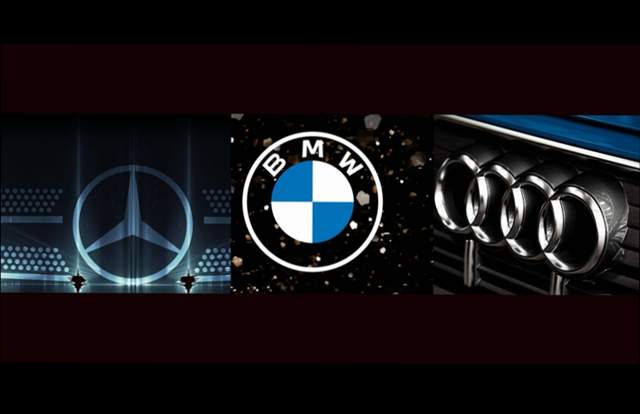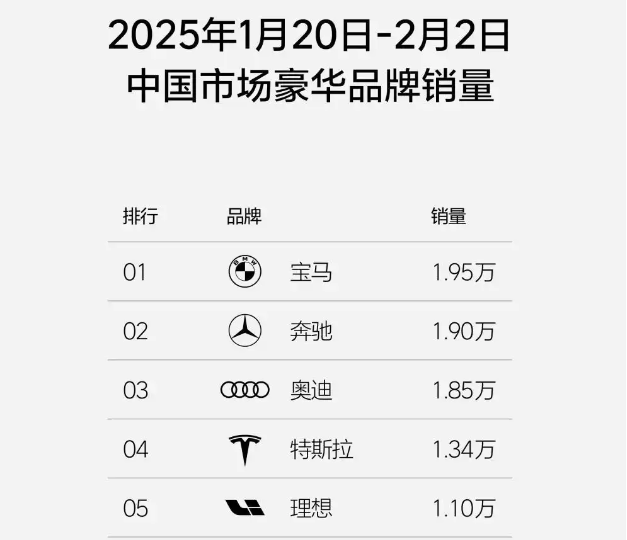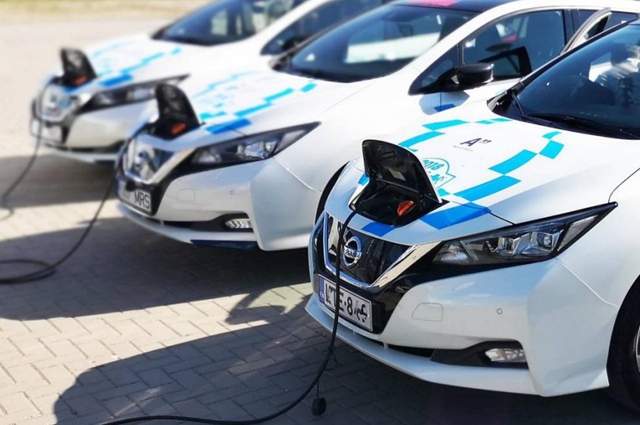Foreign Brands Rise Amid Declining Electric Car Sales as Gasoline Vehicles Make a Strong Comeback
![]() 02/16 2025
02/16 2025
![]() 385
385
Multiple electric car brands have witnessed a steep decline in sales, attributing this drop to the impact of the Spring Festival. However, the announcement of sales figures by foreign brands reveals a stark contrast: gasoline car sales have fallen by a considerably smaller margin compared to electric cars. Leveraging their technological edge in gasoline engines, foreign brands have emerged as the clear winners in this shift.

In the luxury car market, foreign brands hold a particularly commanding advantage. Data from January 20th to February 2nd shows that BBA (BMW, Mercedes-Benz, Audi) dominate the top three spots, with significant leads. Specifically, BMW, Mercedes-Benz, and Audi sold 19,500, 19,000, and 18,500 units respectively. In contrast, Tesla, in fourth place, and Li Auto, in fifth, both electric car brands, sold 13,400 and 11,000 units respectively.
Tesla, which previously saw a surge in sales, with weekly figures peaking at 20,000 units and briefly overtaking BBA to top the luxury car market, now trails significantly behind BMW. This highlights the severity of Tesla's sales decline and the return of luxury car consumers to gasoline brands like BBA, with a notable reduction in purchases of electric car brands.

Instead of persisting in the fiercely competitive luxury car market, several electric car brands have shifted focus to lower market segments. For instance, XPeng has achieved significant sales with the launch of the M03, priced above 100,000 yuan, outperforming many new energy vehicle brands to become the top seller in its segment. This underscores the substantial benefits in the low-to-mid-end market.
In the new energy vehicle market, the top seller's success has primarily been fueled by low-to-mid-end models. By introducing numerous models priced below 200,000 yuan, it has met its monthly sales target of 500,000 units. One of its best-selling models, priced as low as 70,000 yuan, has contributed to over 400,000 sales, surpassing previous champions like the Lavida and the Sylphy. This underscores the immense potential in the low-to-mid-end market.

The primary reason behind the stagnation in electric car sales is the resurgence of gasoline cars. Since November 2024, gasoline cars have staged a fierce comeback, with their market share swiftly recovering from 45% to 58%. Data from January and the first week of February this year indicates that gasoline cars' market share has approached 60%, underscoring the severe pressure on electric cars.
The sharp rebound in gasoline car sales is partly attributed to intense price wars. Under constant pressure from electric vehicles, many gasoline car companies have mounted vigorous counterattacks. Domestic gasoline cars are now priced around 50,000 yuan, while foreign gasoline cars hover around 70,000 yuan. These ultra-low prices have lured many consumers back to gasoline cars.
Another contributing factor is the impact of winter. The low temperatures have exposed several drawbacks of electric cars, such as reduced range and slower charging speeds, which have troubled electric car owners. This has prompted many consumers who were considering electric cars to switch to gasoline cars, further accelerating the rebound in gasoline car sales.
In response to the aggressive offensive by gasoline cars, electric cars have also attempted to counterattack through price wars. However, the price wars in 2024 have already driven electric car prices down to around 70,000 yuan, leaving little room for additional price cuts. Recently, some automakers have introduced intelligent driving equity, allowing high-end, mid-range, and low-end cars to access intelligent driving features for free. This has burst the bubble surrounding intelligent driving.
This move has had a profound impact on new energy vehicle makers, with many intelligent driving companies criticizing this electric car company for its inadequate intelligent driving technology or incomplete hardware configuration. This strategy has the greatest impact on the high-end car market, as intelligent driving was previously one of the ways high-end electric cars challenged BBA. With the veil of mystery around intelligent driving lifted, high-end electric cars are set to face significant challenges.

Domestic electric car brands have once again launched an assault on foreign luxury car brands like BBA through price wars and intelligent driving equity. This undeniably confirms that foreign brands have indeed experienced a significant rebound since the end of last year and are the current winners in the automotive market. The question now is how foreign car brands will respond to these new challenges. Will they initiate another round of price cuts? Given their substantial profits in the European and American markets, foreign brands have the financial cushion to further reduce prices, positioning themselves well for future competitions.








